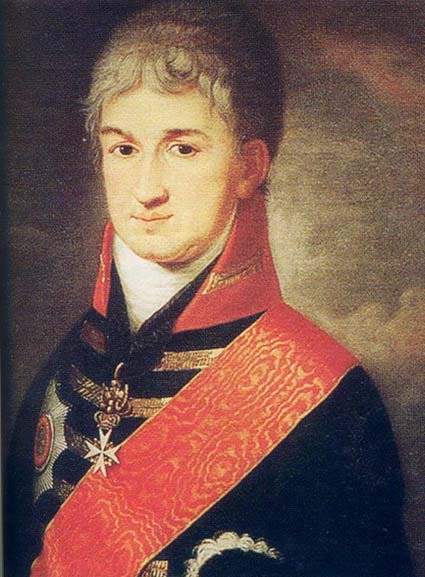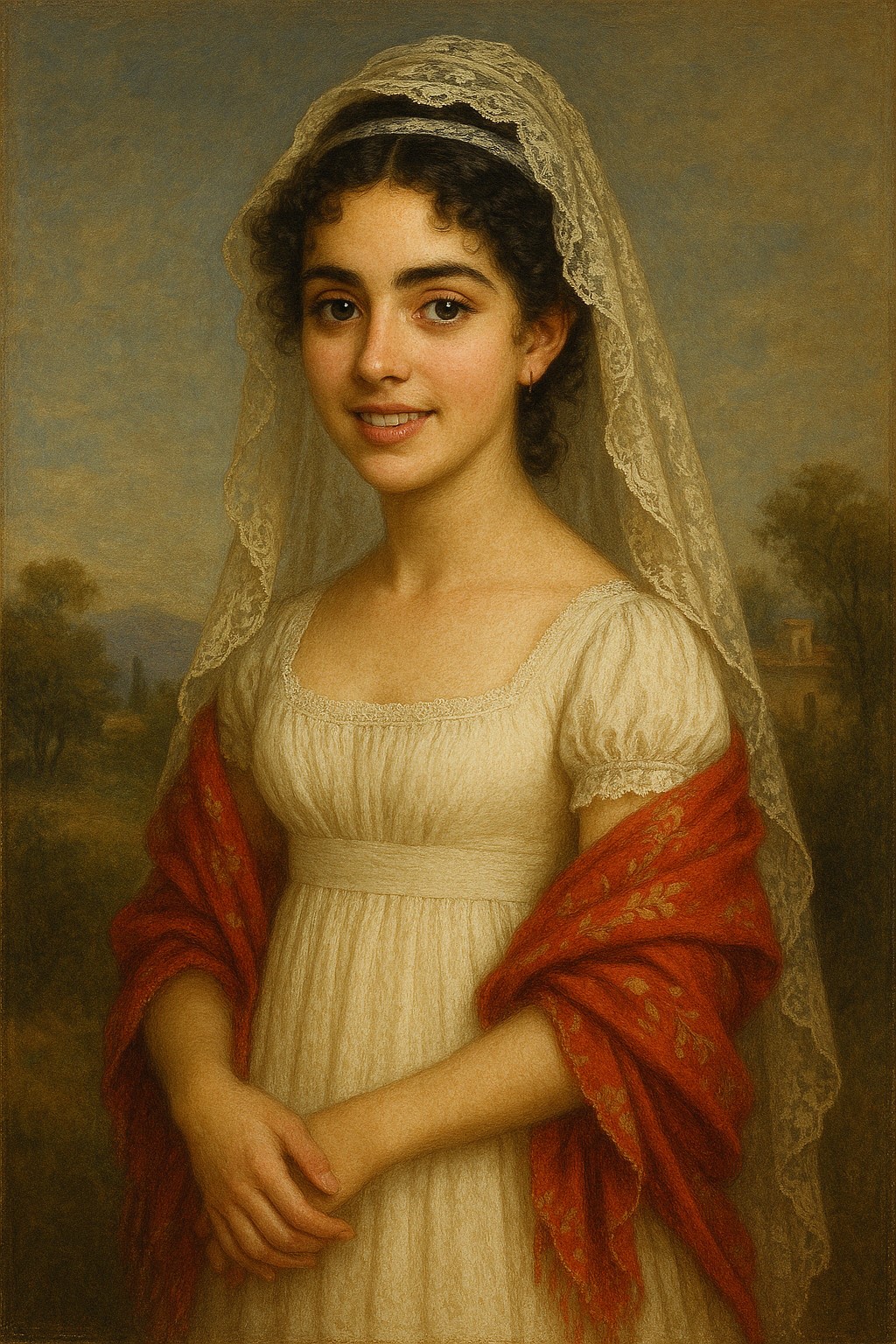Count Nikolai Rezanov and his visit to Presidio

Count Rezanov, the Russian, envoy of the mighty Tsar
Count Nikolai Petrovich Rezanov was a proud and disagreeable man in a court full of proud and disagreeable men. Japanese officials who met him noted that he was more proud and disagreeable than even the Dutch. Three successive Russian Emperors sent him as far as possible - Siberia, Japan, around the world - anywhere but St. Petersburg.
In 1794 Rezanov arrived in Irkutsk as the government representative overseeing the operations of the Shelikhov-Golikov corporation. There he met Shelikhov's daughter, Anna. She was 14, he was 30. Perhaps she was mature for her age. She was definitely extremely well-dowered. There was no conflict of interest at all.
Less than a year later Shelikhov died and Anna inherited his shares in the company. To Rezanov's outraged surprise this left his mother-in-law and not himself as head of the business. He left Irkutsk and spent three years in St. Petersburg working to gain monopoly privileges to trade with and exploit the Russian colonies in the East, similar to those of the British East India Company. Patiently, he worked his way through three sovereigns and finally gained the sole right to trade in Russia's name along America's Pacific shore from latitude 55 degrees northward; and over the chain of islands extending from Kamchatka northward and southward to Japan.
Even so, after a few years mismanagement brought the company's employees to the brink of starvation. As the Imperial family held most of the stock that was not held by Shelikhovs a fleet was sent to circumnavigate the globe and relieve them, going from Sankt Petersburg to Brazil to the Kingdom of Hawaii to Kamchatka. Rezanov went with it as Minister Plenipotentiary.
Along the way Rezanov quarreled with the expedition's leader, Admiral von Krusenstern, over who was supposed to lead the expedition. They were so upset with each other that they communicated solely through notes. This made sharing their single cabin 64 sq. ft cabin uncomfortable, especially as it was occasionally visited by a playful orangutan that happened to be onboard.
Rezanov also quarreled with all other expedition officers who strongly supported von Krusenstern and were not prepared to admit Rezanov's credentials. Later, Rezanov claimed that they and von Krusenstern apologized to him. Von Krusenstern claimed the opposite.
The Tsar wanted Rezanov to do some minor chores during the expedition, such as set up Russian fur trade in Alaska and establish relationships with the Tokugawa Shogunate. The Tokugawa Shogunate objected, and Rezanov was asked to leave the expedition in Kamchatka. There he also learned that von Krusenstern was granted the prestigious Order of St. Anne for his part in the expedition, while Rezanov himself got merely a fancy tobacco box (Rezanov already had an Order of St. Anne, and of a higher degree, but the award indicated the Emperor's opinion on who was right in their argument).
This disappointment contributed to Rezanov's decision to authorize a series of looting raids on Japanese settlements on Sakhalin.
None of this made the Russian colonists at Sitka any better off. They continued to die of scurvy and malnutrition. As a last resort Rezanov purchased a boat and sailed to San Francisco to ask Russia's main competitors in the area, the Spanish, for aid. This was especially perilous as Spain in 1806 belonged to Napoleon, with whom Russia was close to war.
The man responsible for the decision whether to provide this aid was the military commander of the San Francisco Presidio, Don José Darío Argüello. He had a 15 year old daughter, María de la Concepción Marcela Argüello y Moraga. She was, perhaps, mature for her age. Count Rezanov fell passionately in love, and offered marriage.
Conchita returned Rezanov's love, despite the protestations of her family and the Mission's monks. Comandante Argüello loved his daughter. He consented, and the pair were betrothed. Rezanov took a load of food and other necessities ("so much food that there was no space to load it") and headed to relieve Sitka.
His goal was to proceed from Alaska to Kamchatka, and from thence to St. Petersburg over land. In St. Petersburg he hoped to gain the last trifles necessary for his marriage to Conchita - the blessings of the Tsar, the King of Spain, the Pope, and the Patriarch of Moscow. Before departing he left instructions for the founding of Fort Ross.
Somewhere near the middle of Siberia, in Krasnoyarsk, he fell into a frozen river, took a fever, fell off his horse, hit his head, and died.
Over his grave stands a memorial to his love for Conchita - a simple white cross with the words "I will never see you" on one side and "I will never forget you" on the other. The Police Chief of Monterey, Gary E. Brown strew earth and a rose from Conchita's grave over Rezanov's and attended a high mass for them.
https://www.youtube.com/watch?v=dvSRyM3ICyw&t=90s
In 1794 Rezanov arrived in Irkutsk as the government representative overseeing the operations of the Shelikhov-Golikov corporation. There he met Shelikhov's daughter, Anna. She was 14, he was 30. Perhaps she was mature for her age. She was definitely extremely well-dowered. There was no conflict of interest at all.
Less than a year later Shelikhov died and Anna inherited his shares in the company. To Rezanov's outraged surprise this left his mother-in-law and not himself as head of the business. He left Irkutsk and spent three years in St. Petersburg working to gain monopoly privileges to trade with and exploit the Russian colonies in the East, similar to those of the British East India Company. Patiently, he worked his way through three sovereigns and finally gained the sole right to trade in Russia's name along America's Pacific shore from latitude 55 degrees northward; and over the chain of islands extending from Kamchatka northward and southward to Japan.
Even so, after a few years mismanagement brought the company's employees to the brink of starvation. As the Imperial family held most of the stock that was not held by Shelikhovs a fleet was sent to circumnavigate the globe and relieve them, going from Sankt Petersburg to Brazil to the Kingdom of Hawaii to Kamchatka. Rezanov went with it as Minister Plenipotentiary.
Along the way Rezanov quarreled with the expedition's leader, Admiral von Krusenstern, over who was supposed to lead the expedition. They were so upset with each other that they communicated solely through notes. This made sharing their single cabin 64 sq. ft cabin uncomfortable, especially as it was occasionally visited by a playful orangutan that happened to be onboard.
Rezanov also quarreled with all other expedition officers who strongly supported von Krusenstern and were not prepared to admit Rezanov's credentials. Later, Rezanov claimed that they and von Krusenstern apologized to him. Von Krusenstern claimed the opposite.
The Tsar wanted Rezanov to do some minor chores during the expedition, such as set up Russian fur trade in Alaska and establish relationships with the Tokugawa Shogunate. The Tokugawa Shogunate objected, and Rezanov was asked to leave the expedition in Kamchatka. There he also learned that von Krusenstern was granted the prestigious Order of St. Anne for his part in the expedition, while Rezanov himself got merely a fancy tobacco box (Rezanov already had an Order of St. Anne, and of a higher degree, but the award indicated the Emperor's opinion on who was right in their argument).
This disappointment contributed to Rezanov's decision to authorize a series of looting raids on Japanese settlements on Sakhalin.
None of this made the Russian colonists at Sitka any better off. They continued to die of scurvy and malnutrition. As a last resort Rezanov purchased a boat and sailed to San Francisco to ask Russia's main competitors in the area, the Spanish, for aid. This was especially perilous as Spain in 1806 belonged to Napoleon, with whom Russia was close to war.
The man responsible for the decision whether to provide this aid was the military commander of the San Francisco Presidio, Don José Darío Argüello. He had a 15 year old daughter, María de la Concepción Marcela Argüello y Moraga. She was, perhaps, mature for her age. Count Rezanov fell passionately in love, and offered marriage.
Conchita returned Rezanov's love, despite the protestations of her family and the Mission's monks. Comandante Argüello loved his daughter. He consented, and the pair were betrothed. Rezanov took a load of food and other necessities ("so much food that there was no space to load it") and headed to relieve Sitka.
His goal was to proceed from Alaska to Kamchatka, and from thence to St. Petersburg over land. In St. Petersburg he hoped to gain the last trifles necessary for his marriage to Conchita - the blessings of the Tsar, the King of Spain, the Pope, and the Patriarch of Moscow. Before departing he left instructions for the founding of Fort Ross.
Somewhere near the middle of Siberia, in Krasnoyarsk, he fell into a frozen river, took a fever, fell off his horse, hit his head, and died.
Over his grave stands a memorial to his love for Conchita - a simple white cross with the words "I will never see you" on one side and "I will never forget you" on the other. The Police Chief of Monterey, Gary E. Brown strew earth and a rose from Conchita's grave over Rezanov's and attended a high mass for them.
https://www.youtube.com/watch?v=dvSRyM3ICyw&t=90s
